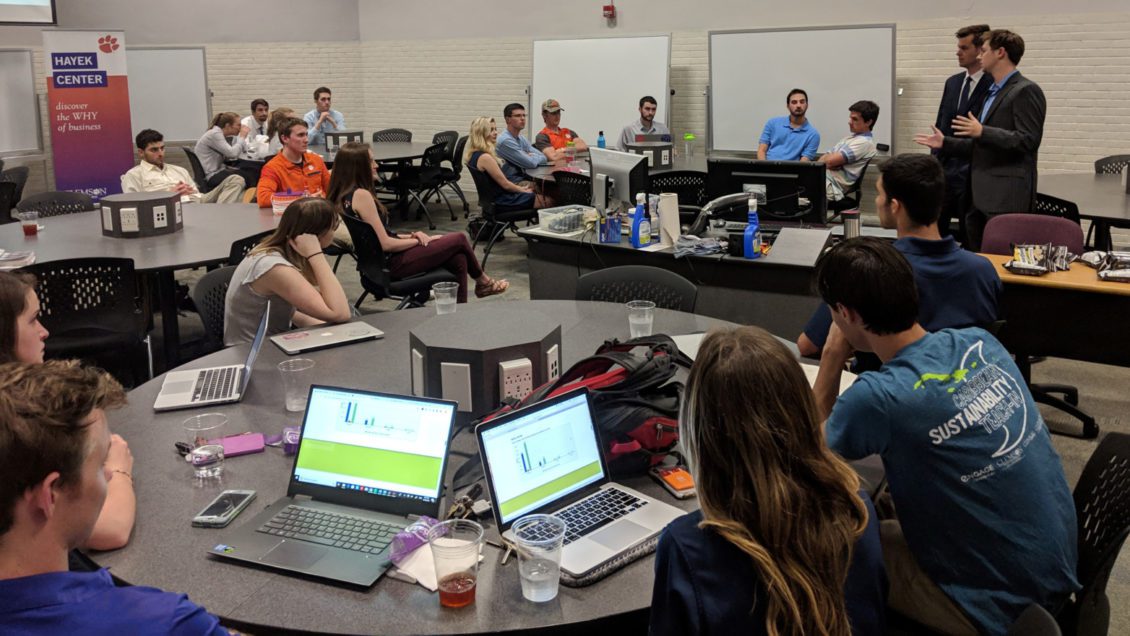Viewing a charitable project through a business lens can be the difference between success and failure.

“Often with community service and other charitable efforts, we abandon our business principles and think good intentions are enough to produce good results. They are not,” said Reed Watson, director of the Hayek Center for the Business of Prosperity.
“To be successful at charity, just like in business, we need a carefully crafted strategy that reflects economic fundamentals and meets the needs of our ‘customers,’ the people we are trying to serve.”
Infusing the principles of business into Clemson University’s international aid projects is the objective of a new program created by The Hayek Center for the Business of Prosperity.
Nine teams of mostly engineering students received a crash course in business and economics during the inaugural Hayek’s Excellence in Research and Outreach (HERO) program. The students are working on a variety of community service projects in developing countries of Haiti and Dominica.
“Basically, our goal is to expose students to business principles so their good intentions are more likely to produce good outcomes,” said Matthew Cope, a senior economics student who helped develop the HERO Prize. “Through this program, the Hayek Center can be a resource for students in and outside the College of Business.”
The Hayek Center is a one-of-a-kind research and learning center that examines the fundamental purpose of business and how it improves the human condition.
Watson said the student teams participating in the HERO program received “speed mentoring” on their international aid projects from faculty and Ph.D. students in the John E. Walker Department of Economics during a day-long economics “boot camp” in late March.
After incorporating the knowledge gained at boot camp, students reworked their plans and presented them again in mid-April, vying for grant funding from the Hayek Center.
The winner of the inaugural HERO Prize, and recipient of a $5,000 prize, was the Aquaculture project team. The students’ goal is to help fish farmers develop a new food to feed tilapia in Cange, Haiti. The lack of access to fish food is limiting the business’s growth.
Senior economics and anthropology double major Sammi Austin and Adam Abdulrahman, a rising junior bioengineering major, are two Aquaculture project members who said the Hayek Center exercise was eye-opening.
“I looked at the project from a more scientific perspective, so the Hayek Center event helped me see things through a different lens,” Adam said. “It made me realize implementation was not a one-step process and I had to give more thought to the effect our project will have on those we’re trying to help, over the long term.”
The $5,000 prize will be used for fish-food testing at Clemson next semester. Students need to find an agricultural blend of products available in Haiti that meet the nutritional needs of tilapia. “And the key takeaway,” said Watson, “is that whatever our students develop in a laboratory on campus has to be replicable and financially feasible in Haiti.”
Because of her interest in international economic development, Sammi became involved with Clemson Engineers for Developing Countries (CEDC), which is home to most of the university’s Haiti aid projects.
“Much of my focus has been on cost, efficiency and how we can implement a fish-food solution as easily as possible. Because of my background, economics and feasibility were always at the forefront of my mind. The HERO program helped us blend science with business in a way that I believe will help us better meet the needs of those farmers we’re trying to help.”
Watson said the best intentions in the world don’t always solve a problem, especially when a local issue is being addressed remotely.
“Sustained economic growth depends on systems that incorporate local knowledge. These students are marrying Clemson’s technical and scientific abilities with what will work in a realistic way locally, by figuring out how to turn agricultural waste into fish food.”
Finishing second in the competition, and recipient of $2,000, was a team that is aiding a tool lending center on the island of Dominica. ENGAGE Tool Lending Center is addressing the demand for tools in helping rebuild the Caribbean island following the devastation of Hurricane Maria in September of 2017. The Tool Lending Center will allow for the creation and maintenance of tools by a local business. Among other tasks, students need to find solutions to ensure tools are returned, through deposits and other methods.
“The Hayek Center will be one of the College of Business’ catalysts for expanding an interdisciplinary mindset across other campus disciplines such as health, education and science,” Watson added. “By intermingling students with diverse perspectives and fostering collaboration among the colleges, sustainable and more positive outcomes will result in solving real-world problems.”
# # #
Get in touch and we will connect you with the author or another expert.
Or email us at news@clemson.edu

